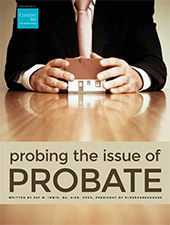When Your Family Doctor Retires — Advice for Seniors
Many seniors in Canada have been with the same family doctor for years. For seniors like Fred and Muriel Davis, having your family doctor retire poses a number of challenges. Read below to find more information about what to do when your family doctor retires, as well as tips to find a new doctor who can meet the current and future medical needs of you and your family.
Fred and Muriel Davis were among Dr. David Campbell’s very first patients. Over the past fifty years the office furniture and receptionists have changed, but Dr. Campbell’s detailed knowledge and sincere interest in their well being has been constant.
When they received written notice that he was retiring, they called to congratulate him, asking who was taking over his practice. “No one — there just aren’t enough doctors going into family practice”.
The notice stated they had six months to find another doctor. Is that fair, and how will they find a new doctor?
When a Family Physician Retires
The College of Physicians and Surgeons of Ontario has strict guidelines for retiring doctors. The physician:
• Is only expected to notify those patients to whom they are actively providing care; and should remind patients where they can go to obtain emergency or urgent care
• Must make appropriate arrangements for either the retention or transfer of patient medical records, and give patients information to access their medical record
• Should try to ensure that patients requiring ongoing care (in hospital or care facilities, or post-operative follow-up) will continue to receive necessary care
• Should attempt to facilitate patient access to prescription medication required for long-term or chronic conditions by providing the patient with renewals or repeats of the required medication
In fact, Dr. Campbell has acted within the College's guidelines by:
• Providing reasonable notice
• Attaching a list of local walk-in clinics, emergency departments and the Telephone Health Advisory Service (1-866-553-7205)
• Meeting with patients regarding medication orders
But is this really enough support for a typical senior?
Who is Accepting New Patients in My Area?
There are a number of ways you can find a new doctor in your area who is accepting new patients:
• Ask the retiring doctor for recommendations
• Since all patients will be relocating, ask the staff where other patients are transferring
• Ask friends, colleagues and the local hospital for names – but remember, your search will be confined to those physicians accepting new patients
• Consult the College of Physicians and Surgeons’ Doctor Search Service at:
• (416) 967-2603
• (800) 268-7096 ext. 306
Evaluating Your Options
Once you have a list of who is accepting new patients, do some research. Call the doctor’s office (a challenge in itself sometimes!) and ask the office manager:
• How old is the doctor?
• Be sure your new doctor isn't retiring soon
• How long have they been in practice?
• Does the doctor have other seniors as patients?
• Get a sense of whether senior patients, who may take up more office time, are indeed welcome in this practice
• What are the major services of this family practice?
• One senior recently signed on with a new family doctor, only to find the office teeming with flyers promoting her Botox injection services!
• Where is the office?
• Is it convenient to your home?
• Is there appropriate parking or transit access?
• Is the office accessible?
• This will be important someday, even if it isn’t right now
• One geriatrician, who practices from a small house, assured patients there were wheelchair facilities - but there were 8 steps leading to the front door!
• Consider joining a group practice
• This will allow you to see any physician in the group without having to wait to see a certain one
• Inquire about after-hours policy, laboratory services and their hospital privileges
Making a Choice
Once you have developed a short-list of three to five names, book an appointment:
• Observe the waiting room — the staff, how they treat other patients and other seniors; the number of patients waiting, the wait time, and the general atmosphere
• Meet with the doctor; explain your mission and gauge their response — do they listen? Do they seem interested and motivated to take you as a patient?
• Review your mental check-list, listen to your instincts, make your choice and have your files transferred. Congratulations, you've found a new doctor!
It may seem like six months is plenty of time, but finding the right doctor for you will take time. Since this will be one of most important relationships in the coming years, invest the time and effort to make the best choice.
* * * * *
What factors are most important to you when choosing a family doctor? Do you think it's important to find a family doctor who specializes in geriatrics? Share your thoughts in the Comments section below.
Related:
Refill Buddy Makes Refilling Prescriptions Fast and Easy
Community Service Agency Helps Seniors Get Around
Senior Care Advisor
Drug Abuse in Seniors: Tips for Managing Prescription Medications


